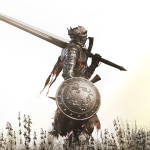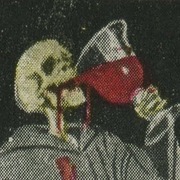|
In this thread, we choose one work of Resources: Project Gutenberg - http://www.gutenberg.org - A database of over 17000 books available online. If you can suggest books from here, that'd be the best. SparkNotes - http://www.sparknotes.com/ - A very helpful Cliffnotes-esque site, but much better, in my opinion. If you happen to come in late and need to catch-up, you can get great character/chapter/plot summaries here.  For recommendations on future material, suggestions on how to improve the club, or just a general rant, feel free to PM the moderation team. For recommendations on future material, suggestions on how to improve the club, or just a general rant, feel free to PM the moderation team.  Past Books of the Month [for BOTM before 2019, refer to archives] 2019: January: Roadside Picnic by Arkady and Boris Strugatsky February: BEAR by Marian Engel March: V. by Thomas Pynchon April: The Doorbell Rang by Rex Stout May: Thinking, Fast and Slow by Daniel Kahneman June: 1491: New Revelations of the Americas Before Columbus by Charles C. Mann July: The Art of Fielding by Chad Harbach August: Memoirs of Extraordinary Popular Delusions and the Madness of Crowds by Charles Mackay September: Picnic at Hanging Rock by Joan Lindsay October: Her Body and Other Parties by Carmen Maria Machado November: The Maltese Falcon by Dashiell Hammett December: Moby Dick by Herman Melville 2020: January: The Jungle by Upton Sinclair February: WE by Yevgeny Zamyatin March: The Autobiography of Benvenuto Cellini by Benvenuto Cellini April: The Decameron by Giovanni Boccaccio May: Black Lamb and Grey Falcon by Dame Rebecca West June: The African Queen by C. S. Forester July: The End of Policing by Alex S. Vitale August: The Merry Adventures of Robin Hood, of Great Renown in Nottinghamshire, by Howard Pyle September: Strange Hotel, by Eimear McBride October:Kwaidan: Stories and Studies of Strange Things (怪談)("Ghost Stories"), by Lafcadio Hearn November: A Libertarian Walks Into a Bear: The Utopian Plot to Liberate an American Town (And Some Bears) , by Matthew Hongoltz Hetling December: Ignition!: An Informal History of Liquid Rocket Propellants by John Drury Clark 2021: January: The Mark of Zorro by Johnston McCulley February: How to Read Donald Duck by Ariel Dorfman and Armand Mattelart March: Carrier Wave by Robert Brockway April: The Third Policeman by Flann O'Brian May: You Can't Win by Jack Black June:Treasure Island by Robert Louis Stevenson July:Can Such Things Be by Ambrose Bierce August: Swann's Way by Marcel Proust September:A Dreamer's Tales by Edward John Moreton Drax Plunkett, 18th Baron of Dunsany October:We Have Always Lived in the Castle by Shirley Jackson November:Strong Poison by Dorothy Sayers December:Hogfather by Terry Pratchett 2022: January: The Sun Also Rises by Earnest Hemingway February: Les Contes Drolatiques by Honore de Balzac March: Depeche Mode by Serhiy Zhadan April: Kalpa Imperial by Angélica Gorodischer (Trans. Le Guin) May:Night Flight by Antoine de Saint-Exupery June: The Forgotten Beasts of Eld by Patricia McKillip Current:  The Parable of the Sower by Octavia Butler[/url] Book available here: https://www.amazon.com/Parable-Sower-Earthseed-Octavia-Butler/dp/0446675504 https://www.kobo.com/us/en/ebook/parable-of-the-sower About the Book quote:Beginning in 2024, when society in the United States has grown unstable due to climate change, growing wealth inequality, and corporate greed, Parable of the Sower takes the form of a journal kept by Lauren Oya Olamina, an African American teenager. Her mother abused drugs during her pregnancy and left Lauren with "hyper-empathy" or "sharing" – the uncontrollable ability to feel the sensations she witnesses in others, particularly the abundant pain in her world. quote:Earlier this month, Octavia Butler’s novel Parable of the Sower made it onto the New York Times’ bestseller lists 27 years after its original publication. The book, one of two in a planned trilogy that was never completed, follows Lauren Oya Olamina, a Black teenager who lives in an environmentally decayed and socially chaotic California in the 2020s—at the time, still a distant, futuristic decade. In Parable of the Sower and Butler’s 1998 follow-up, Parable of the Talents, Olamina leaves the gated compound where she grew up, goes on the road, starts (and loses) her own community, and becomes a leader of people, spreading a set of ideas she calls “Earthseed.” https://slate.com/culture/2020/09/octavia-butler-parable-of-the-sower-talents-pandemic.html About the Author quote:Octavia Estelle Butler (June 22, 1947 – February 24, 2006) was an American science fiction author and a multiple recipient of the Hugo and Nebula awards. In 1995, Butler became the first science-fiction writer to receive a MacArthur Fellowship.[2][3] Themes
Pacing  Read as thou wilt is the whole of the law. Please post after you read! Please bookmark the thread to encourage discussion. References and Further Reading https://www.newyorker.com/books/second-read/octavia-butlers-prescient-vision-of-a-zealot-elected-to-make-america-great-again A podcast about these books: https://podcasts.apple.com/us/podcast/octavias-parables/id1519024926 quote:The Parable of the Sower (sometimes called the Parable of the Soils) is a parable of Jesus found in Matthew 13:1–23, Mark 4:1–20, Luke 8:4–15 and the extra-canonical Gospel of Thomas.[1] Discussion of Past Months You can still keep talking about books from prior months, too! Just keep comments for those books in their respective threads -- that's why we link them all at the top! The party doesn't have to stop just because another has started! Suggestions for Future Months These threads aren't just for discussing the current BOTM; If you have a suggestion for next month's book, please feel free to post it in the thread below also. Generally what we're looking for in a BotM are works that have 1) accessibility -- either easy to read or easy to download a free copy of, ideally both 2) novelty -- something a significant fraction of the forum hasn't already read 3) discussability -- intellectual merit, controversiality, insight -- a book people will be able to talk about. Final Note: Thanks, and we hope everyone enjoys the book! Hieronymous Alloy fucked around with this message at 22:55 on Jul 3, 2022 |
|
|
|
|

|
| # ? Apr 24, 2024 06:07 |
|
Hey, I literally bought this book in person today along with lilliths brood. Guess I'll be reading it now.
|
|
|
|
|
I re-read this one recently and it's downright chilling now compared to how it was ten to fifteen years ago. Maybe I was too stupid to see the politics then.
|
|
|
|
|
I didn't think this book would be scary. But it is getting under my skin somehow.
|
|
|
|
BattyKiara posted:I didn't think this book would be scary. But it is getting under my skin somehow. Same here. As I was reading I became viscerally depressed at the 'just-around-the-corner' feel of it. I had to finish it today in a long sitting just to get some sort of closure, if not much relief. Very potent.
|
|
|
|
I'm about a quarter of the way through and, while I wouldn't say it's alarming or depressing me personally, I can see how this reads as less far fetched and more of a specific prediction today. I'm surprised the "community" the protagonist lives in doesn't contain a stronger communal bond, like a tribe. It seems to simultaneously be merely a neighborhood from the 20th century and also an isolated settlement in a hostile world. But I suspect that's kind of the point and things will change either for this community or some other by the end of the book and that's how we'll arrive at the New Society.
|
|
|
|
Finished the book last weekend. Enjoyed it, and may pick up the sequel at some point, though I feel like I've had my fill for now of that fairly oppressive setting. I wasn't expecting the may-september romance, but it was handled well; it was clear the author wasn't simply acting out some fetish or fantasy. One thing that seemed to drop off pretty rapidly was any consideration of language; it was mentioned in the opening pages that the family sometimes converses in Spanish but I don't really recall it ever being brought up or made any sort of plot point later? The politics/thesis of the book is clear, this is almost, what, the anti Atlas Shrugged? A clear argument for inclusivity, cooperation, and empathy. Oh, I appreciated how much the author was willing to have disappearances go unresolved; the characters just leave a hole in the narrative as they do in their relation's continuing lives.
|
|
|
|
I've been working on reading this one and it's good but it's making me depressed so I haven't gotten very far in it. Thoughts for next month? Have a few suggestions already, I'll try to get a poll up this weekend.
|
|
|
|
|
Yeah I just finished it and I really regret taking this long to read it. It probably wouldn't have been such a struggle if I had tried a decade ago. World really looking poo poo rn but i like earthseed as a religion, sure. Give me some of that Einstein drug
|
|
|
|
|

|
| # ? Apr 24, 2024 06:07 |
|
I read this a couple years ago, maybe 2019, and I remember just being downright anxious by it, it's a dystopia that is not far-fetched or far away. It is an apocalypse that happens gradually without anyone noticing and it scared the poo poo out of me. I remember when the neighborhood falls, it's *the* point when the characters realize, oh, status quo is dead, life as we know it is dead. Scares the poo poo out of me that I might one day feel exactly that, due to political instability or climate change or what have you. Never read the sequel, is it any good?
|
|
|
|















